第四讲 2023中考英语一轮教材梳理复习七年级下册Units 5-8 课件(共22张PPT)
文档属性
| 名称 | 第四讲 2023中考英语一轮教材梳理复习七年级下册Units 5-8 课件(共22张PPT) |  | |
| 格式 | zip | ||
| 文件大小 | 2.3MB | ||
| 资源类型 | 试卷 | ||
| 版本资源 | 人教新目标(Go for it)版 | ||
| 科目 | 英语 | ||
| 更新时间 | 2023-02-13 20:28:27 | ||
图片预览

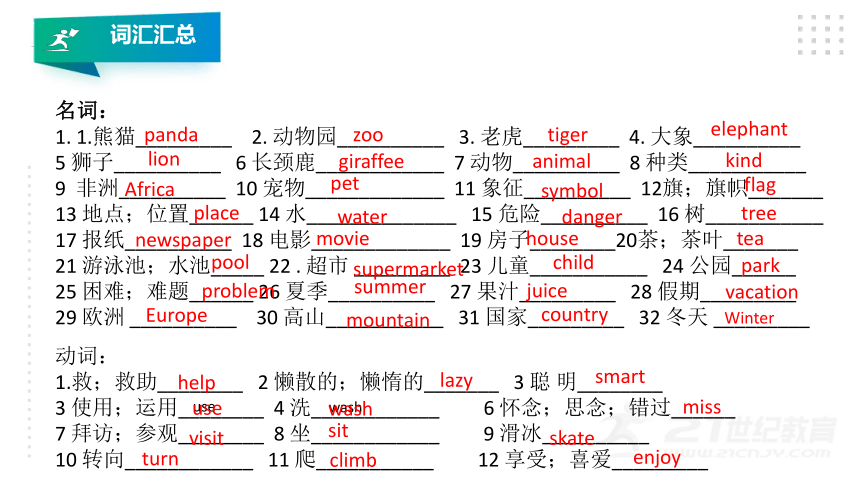
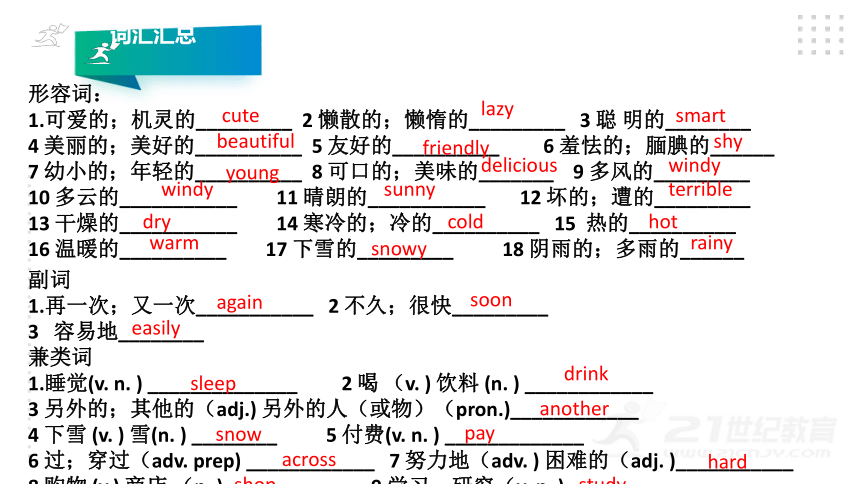
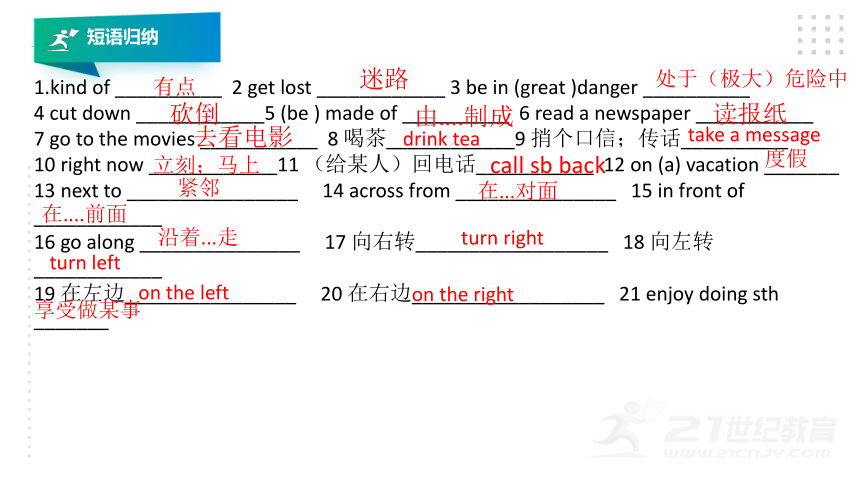
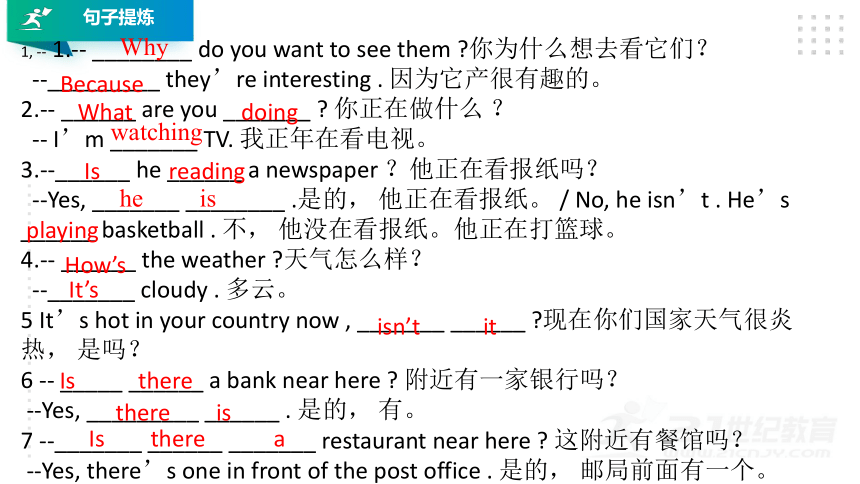
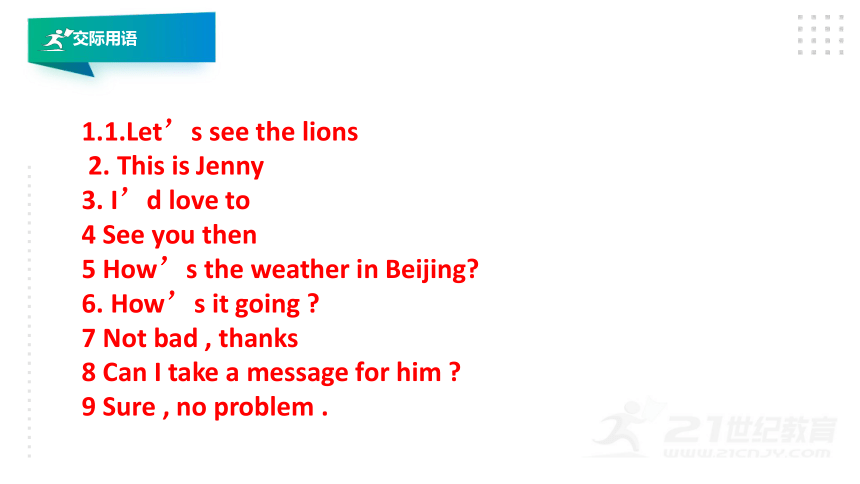
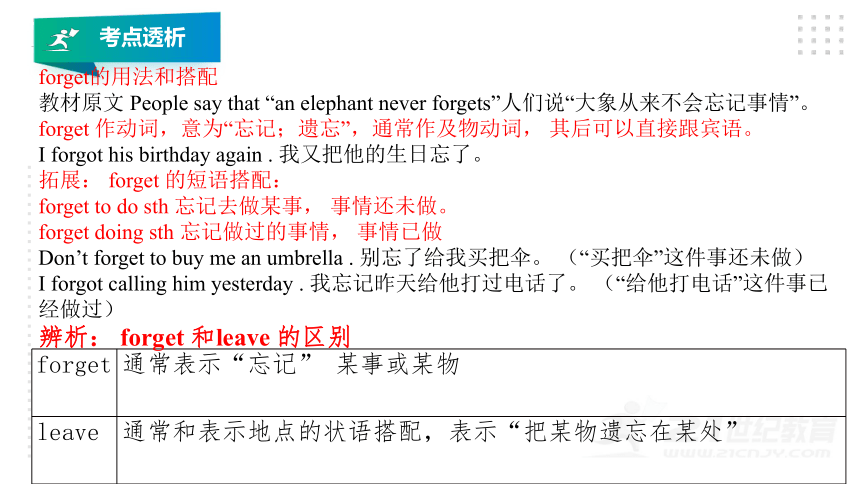
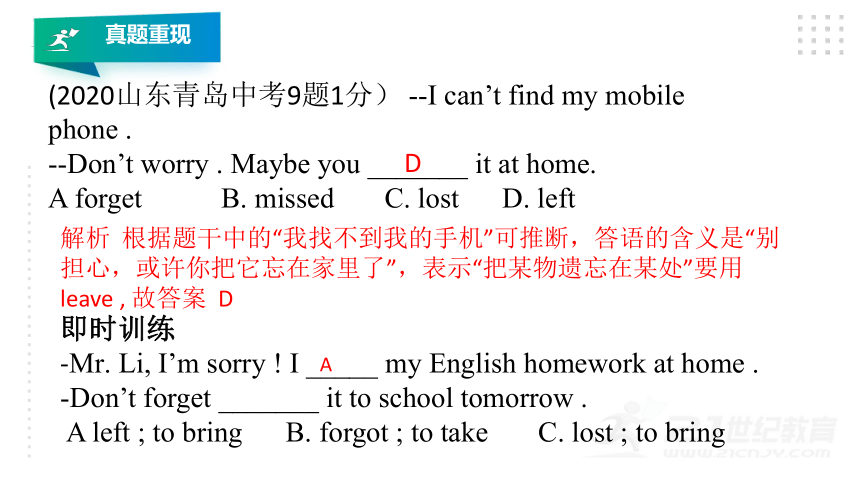
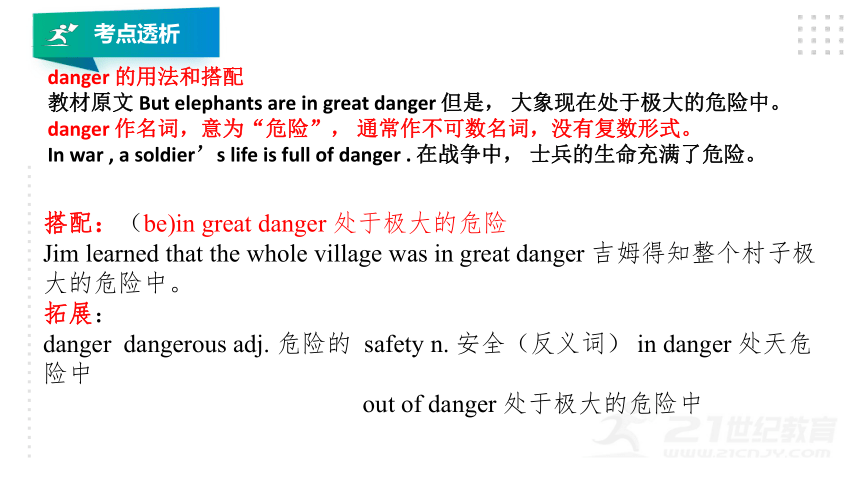
文档简介
(共22张PPT)
第四讲 七年级下册 Units5-8
中考一轮复习3+2 全国版
词汇汇总
名词:
1. 1.熊猫_________ 2. 动物园__________ 3. 老虎_________ 4. 大象__________
5 狮子__________ 6 长颈鹿____________ 7 动物__________ 8 种类___________
9 非洲__________ 10 宠物_____________ 11 象征__________ 12旗;旗帜_______
13 地点;位置______ 14 水______________ 15 危险__________ 16 树___________
17 报纸__________ 18 电影_____________ 19 房子________20茶;茶叶_______
21 游泳池;水池_____ 22 . 超市 _________ 23 儿童___________ 24 公园______
25 困难;难题______ 26 夏季__________ 27 果汁_________ 28 假期_________
29 欧洲 __________ 30 高山___________ 31 国家_________ 32 冬天 _________
panda
zoo
tiger
elephant
lion
giraffee
animal
kind
Africa
pet
symbol
flag
place
water
danger
tree
newspaper
movie
house
tea
pool
supermarket
child
动词:
1.救;救助________ 2 懒散的;懒惰的_______ 3 聪 明________
3 使用;运用________ 4 洗____________ 6 怀念;思念;错过______
7 拜访;参观________ 8 坐____________ 9 滑冰__________
10 转向____________ 11 爬___________ 12 享受;喜爱_________
park
problem
summer
juice
vacation
Europe
mountain
country
Winter
help
lazy
smart
use
wash
miss
visit
sit
skate
turn
climb
enjoy
use
wash
形容词:
1.可爱的;机灵的_________ 2 懒散的;懒惰的_________ 3 聪 明的________
4 美丽的;美好的__________ 5 友好的__________ 6 羞怯的;腼腆的______
7 幼小的;年轻的__________ 8 可口的;美味的_______ 9 多风的_________
10 多云的___________ 11 晴朗的___________ 12 坏的;遭的_________
13 干燥的___________ 14 寒冷的;冷的__________ 15 热的__________
16 温暖的__________ 17 下雪的_________ 18 阴雨的;多雨的______
cute
beautiful
lazy
smart
shy
young
delicious
windy
sunny
windy
dry
cold
warm
snowy
friendly
词汇汇总
terrible
rainy
hot
副词
1.再一次;又一次___________ 2 不久;很快_________
3 容易地________
兼类词
1.睡觉(v. n. ) ______________ 2 喝 (v. ) 饮料 (n. ) ____________
3 另外的;其他的(adj.) 另外的人(或物)(pron.)____________
4 下雪 (v. ) 雪(n. ) ________ 5 付费(v. n. ) _____________
6 过;穿过(adv. prep) ____________ 7 努力地(adv. ) 困难的(adj. )___________
8 购物 (v.) 商店 (n. ) ____________ 9 学习;研究(v. n. )________________
10 南方的(adj. ) 南;南方(n. )_____________
again
easily
pay
soon
drink
sleep
another
south
snow
across
hard
shop
study
短语归纳
1.kind of __________ 2 get lost ____________ 3 be in (great )danger __________
4 cut down ____________5 (be ) made of __________ 6 read a newspaper ___________
7 go to the movies ___________ 8 喝茶____________9 捎个口信;传话__________
10 right now ____________11 (给某人)回电话___________ 12 on (a) vacation _______
13 next to ________________ 14 across from _______________ 15 in front of ____________
16 go along _______________ 17 向右转__________________ 18 向左转____________
19 在左边________________ 20 在右边__________________ 21 enjoy doing sth _______
有点
砍倒
处于(极大)危险中
读报纸
由....制成
drink tea
去看电影
take a message
迷路
立刻;马上
call sb back
紧邻
在...对面
在....前面
度假
沿着...走
turn right
turn left
on the left
on the right
享受做某事
句子提炼
1, -- 1.-- ________ do you want to see them 你为什么想去看它们?
--_________ they’re interesting . 因为它产很有趣的。
2.-- ______ are you _______ 你正在做什么 ?
-- I’m _______ TV. 我正年在看电视。
3.--______ he ______ a newspaper ?他正在看报纸吗?
--Yes, _______ ________ .是的, 他正在看报纸。 / No, he isn’t . He’s ______ basketball . 不, 他没在看报纸。他正在打篮球。
4.-- ______ the weather 天气怎么样?
--_______ cloudy . 多云。
5 It’s hot in your country now , _______ ______ 现在你们国家天气很炎热, 是吗?
6 -- _____ ______ a bank near here 附近有一家银行吗?
--Yes, _________ ______ . 是的, 有。
7 --_______ ______ _______ restaurant near here 这附近有餐馆吗?
--Yes, there’s one in front of the post office . 是的, 邮局前面有一个。
Why
Because
What doing
watching
he is
Is reading
playing
How’s
It’s
isn’t it
Is there
there is
Is there a
交际用语
1.1.Let’s see the lions
2. This is Jenny
3. I’d love to
4 See you then
5 How’s the weather in Beijing
6. How’s it going
7 Not bad , thanks
8 Can I take a message for him
9 Sure , no problem .
考点透析
forget的用法和搭配
教材原文 People say that “an elephant never forgets”人们说“大象从来不会忘记事情”。
forget 作动词,意为“忘记;遗忘”,通常作及物动词, 其后可以直接跟宾语。
I forgot his birthday again . 我又把他的生日忘了。
拓展: forget 的短语搭配:
forget to do sth 忘记去做某事, 事情还未做。
forget doing sth 忘记做过的事情, 事情已做
Don’t forget to buy me an umbrella . 别忘了给我买把伞。 (“买把伞”这件事还未做)
I forgot calling him yesterday . 我忘记昨天给他打过电话了。 (“给他打电话”这件事已经做过)
forget 通常表示“忘记” 某事或某物
leave 通常和表示地点的状语搭配,表示“把某物遗忘在某处”
辨析: forget 和leave 的区别
真题重现
(2020山东青岛中考9题1分) --I can’t find my mobile phone .
--Don’t worry . Maybe you _______ it at home.
A forget B. missed C. lost D. left
即时训练
-Mr. Li, I’m sorry ! I _____ my English homework at home .
-Don’t forget _______ it to school tomorrow .
A left ; to bring B. forgot ; to take C. lost ; to bring
解析 根据题干中的“我找不到我的手机”可推断,答语的含义是“别担心,或许你把它忘在家里了”,表示“把某物遗忘在某处”要用leave , 故答案 D
D
A
考点透析
danger 的用法和搭配
教材原文 But elephants are in great danger 但是, 大象现在处于极大的危险中。
danger 作名词,意为“危险”, 通常作不可数名词,没有复数形式。
In war , a soldier’s life is full of danger . 在战争中, 士兵的生命充满了危险。
搭配:(be)in great danger 处于极大的危险
Jim learned that the whole village was in great danger 吉姆得知整个村子极大的危险中。
拓展:
danger dangerous adj. 危险的 safety n. 安全(反义词) in danger 处天危险中
out of danger 处于极大的危险中
真题重现
(2020独家原创试题)These wild animals are ______ . Let’s do something to save them.
A in danger B. in silence C. in public D. in time
解析:根据本题语境可知,这些野生动物 “处于危险中”,in danger 符合题意,故答案为A。
答案:A
即时训练
将句子中汉语部分译成英语。
Whales are ______________ because some people make their ocean home dirty and others kill them for meat . (处于危险之中)
A
in danger
考点透析
across from的搭配和across 的用法
教材原文The pay phone is across from the library . 付费电话在图书馆的书面。
across from 意为“在..对面”, 和opposite 同义。
There is a big market across from /opposite the post office 邮局对面有一个市场 。
辨析:across , through 和over 的区别
across 意为“横穿;穿过”,强调在物体的表面穿过,通常和马路“road,street”或河流(river , stream)等搭配。
through 意为“穿过;穿透”,强调从物体的中间或某个立体空间穿过,通常和城市(city)森林(forest )或隧道(tunnel)等搭配
over 意为“越过;从一边到加一边”,强调在物体的上方穿过
真题重现
(2021江苏连云港6题1分) --Bill , did you see Tom
--Yes, he just parked his car here and then hurried _____ the street .
A through B. over C. past D. across
解析 答语中提到了“他只是把他的汽车停在这里,然后就匆匆忙忙地过马路了”,和the street 搭配,表示“穿过;横穿”要用across , 故答案为D。
D
即时训练
--Oh, my god !I’ve left my keys in the room , I’ll have to get in ______ the window.
--It’s dangerous . You’d better wait for your mom to come back .
A past B. over C. across D. through
D
spend的用法和易混词
教材原文I like to spend time there on weekends 我周末喜欢花时间待在那里。
Spend作动词,意为“花费(时间或金钱等)
She often spends most of her free time on painting . 她经常把她的大部分空闲时间都花在画画上。
Don’t spend too much money buying these useless things . 不要花那么多钱买这些无用的东西 。
考点透析
辨析:
spend 人和主语,表示花费时间或金钱,后接on sth 或(in )doing sth
cost 物作主语,表示“某物花费多少钱”
take 可用于固定句型,表示某人花费一段时间做某事,其句式结构为:It takes /took sb +一段时间+do do sth
pay 多与介词for 连用。
辨析
真题重现
(2021重庆实验外国语学校第一次月考22题1分)--How long did it _____ you to make this model car
--Nearly 5 days .
A take B. spend C. cost D. pay
A
解析:根据It takes /took sb some time to do sth 的句式结构可知答案为A。
答案:A
即时训练
(2021山东青岛局属四校期末联考17题1分)Smart phones are more and more popular , but they still _____ too much.
A cost B. take C. spend D. pay
C
现在进行时
They are waiting for me at the bus stop at the moment . 他们现在正在公共汽车站等我。
Look!They are playing basketball over there. 看!他们正在那边打篮球。
语法聚焦
现在进行时的用法,构成和时间状语
用法 表示现在或此刻正在发生的动作或存在的状态
基本结构 主语+am/is/are+现在分词+其他
时间状语 now, at the moment , these days 或当look, listen等位于句首时。
注意点
(1) 现在分词通常在动词词尾加-ing . 如: swimming , looking , reading , playing 等 。
(2) 对于表示位置移动的动词来说, 通常用现在进行时来表示将来, 如:
I’m leaving for Shanghai tomorrow . 明天我打算去上海。
真题重现
(2021山东济南长清三月检测46题1分) -May I speak to Mrs. Black
-Sorry, Mum can’t come to the phone now . She _____ a shower.
A. has B. had C. is having D. was having
C
解析 根据本题语境可知,妈妈现在不能接电话,她正在洗沐浴,由此可知要用现在进行时,故答案为C。
即时训练
(2020北京东城期末9题1分) -Look! It _____ heavily outside .
- Too bad . I’ve fogotten to take my umbrella .
A. rains B. is rainign C. was rainging D. will rain
B
语法聚焦
语法聚焦
There be 句型
there be 句型时英语中最常见的又非常重要的句型,不管在口语中还是在书面语中,there be句型的使用频率都很高。
(1)结构:There be (is, are , was, were )+名词+地点状语。
eg: There are fifty-two students in our class .
(2)用法:be动词必须和主语在人称和数上保持上一致。如果主语部分时两个或两个以上的并列主语,be的形式则和第一个名词保持一致,既就近一致原则。
There is a shop at the corner . 在拐角处有家商店。
There are two books on the desk . 课桌上有两本书。
There is a desk and seven chairs in the room. 房间里有一张桌子和七把椅子。
((2021吉林省实验中学一模44题1分) There ________ somoe old people taking a walk in the park .
A. is B. are C. had D. have
真题重现
B
解析 there be 句型遵循就近原则,some old people 为复数,因此为are .
即时训练
(2021山东济南槐荫期末47题1分) There _______ a teacher and many students in the classrom.
A. are B. is C. has D. have
B
语法聚焦
反义疑问句
由陈述部分+附加问句构成, 而且符合“前肯后否”或“前否后肯”的原则 。
This computer is cheap , isnt’ it 这台电脑很便宜,是吗?
You haven’t done much , have you 你没有做太多的事情 , 是吗?
Some plants never blossom , do they 一些植物从不开花, 是吗?
【拓展】注意以下两种情况:
(1) 以let’s开头的祈使句,附加问句用shall we ; 以let us 开头的祈使句,附加问句用will you .如:
Let’s go and listen to the music , shall we 我们去听音乐,好吗?
Let us wait for her in the reading room will you 让我们在阅览室里等她,可以吗?
(2) 反意疑意句的答语
对反意疑问句作加答时,如果事实是肯定的,则用yes,后跟肯定形式的简略回答方式; 若事实是否定的,则用no, 后跟否定形式的简略回答形式。
-Lucy skates very well , doesn’t she 露西滑冰滑得非常好,是吗?
-Yes , she does 是的,她滑得很好。
-They don’t like the house ,, do they 他们不喜欢这套房子,是吗?
-No, they don’t . 是的, 他们不喜欢 。
真题重现
(2020内蒙古呼和浩特中考11题1分) -He doesn’t speak English or Japanese , ______
-______ . He speaks Chinese .
A. does he ; Yes, he doesn’t B. doesn’t he ; No, he does
C. does he ; No, he doesn’t D. does he ; Yes, he does
解析 本题考查反意疑问句的结构和答语。 陈述部分含有doesn’t speak , 故附和问句要用does he , 先排除B. 再结合答语中的“他说汉语”可推断,他不说英语和日语,故答语是“No, he doesn’t .”. 故答案为C。
C
即时训练
(2020江西南昌大学附中第二次月考30题1分) He used to be silent , _______
A. was he B. wasn’t he C. did he D. didn’t he
D
https://www.21cnjy.com/help/help_extract.php
第四讲 七年级下册 Units5-8
中考一轮复习3+2 全国版
词汇汇总
名词:
1. 1.熊猫_________ 2. 动物园__________ 3. 老虎_________ 4. 大象__________
5 狮子__________ 6 长颈鹿____________ 7 动物__________ 8 种类___________
9 非洲__________ 10 宠物_____________ 11 象征__________ 12旗;旗帜_______
13 地点;位置______ 14 水______________ 15 危险__________ 16 树___________
17 报纸__________ 18 电影_____________ 19 房子________20茶;茶叶_______
21 游泳池;水池_____ 22 . 超市 _________ 23 儿童___________ 24 公园______
25 困难;难题______ 26 夏季__________ 27 果汁_________ 28 假期_________
29 欧洲 __________ 30 高山___________ 31 国家_________ 32 冬天 _________
panda
zoo
tiger
elephant
lion
giraffee
animal
kind
Africa
pet
symbol
flag
place
water
danger
tree
newspaper
movie
house
tea
pool
supermarket
child
动词:
1.救;救助________ 2 懒散的;懒惰的_______ 3 聪 明________
3 使用;运用________ 4 洗____________ 6 怀念;思念;错过______
7 拜访;参观________ 8 坐____________ 9 滑冰__________
10 转向____________ 11 爬___________ 12 享受;喜爱_________
park
problem
summer
juice
vacation
Europe
mountain
country
Winter
help
lazy
smart
use
wash
miss
visit
sit
skate
turn
climb
enjoy
use
wash
形容词:
1.可爱的;机灵的_________ 2 懒散的;懒惰的_________ 3 聪 明的________
4 美丽的;美好的__________ 5 友好的__________ 6 羞怯的;腼腆的______
7 幼小的;年轻的__________ 8 可口的;美味的_______ 9 多风的_________
10 多云的___________ 11 晴朗的___________ 12 坏的;遭的_________
13 干燥的___________ 14 寒冷的;冷的__________ 15 热的__________
16 温暖的__________ 17 下雪的_________ 18 阴雨的;多雨的______
cute
beautiful
lazy
smart
shy
young
delicious
windy
sunny
windy
dry
cold
warm
snowy
friendly
词汇汇总
terrible
rainy
hot
副词
1.再一次;又一次___________ 2 不久;很快_________
3 容易地________
兼类词
1.睡觉(v. n. ) ______________ 2 喝 (v. ) 饮料 (n. ) ____________
3 另外的;其他的(adj.) 另外的人(或物)(pron.)____________
4 下雪 (v. ) 雪(n. ) ________ 5 付费(v. n. ) _____________
6 过;穿过(adv. prep) ____________ 7 努力地(adv. ) 困难的(adj. )___________
8 购物 (v.) 商店 (n. ) ____________ 9 学习;研究(v. n. )________________
10 南方的(adj. ) 南;南方(n. )_____________
again
easily
pay
soon
drink
sleep
another
south
snow
across
hard
shop
study
短语归纳
1.kind of __________ 2 get lost ____________ 3 be in (great )danger __________
4 cut down ____________5 (be ) made of __________ 6 read a newspaper ___________
7 go to the movies ___________ 8 喝茶____________9 捎个口信;传话__________
10 right now ____________11 (给某人)回电话___________ 12 on (a) vacation _______
13 next to ________________ 14 across from _______________ 15 in front of ____________
16 go along _______________ 17 向右转__________________ 18 向左转____________
19 在左边________________ 20 在右边__________________ 21 enjoy doing sth _______
有点
砍倒
处于(极大)危险中
读报纸
由....制成
drink tea
去看电影
take a message
迷路
立刻;马上
call sb back
紧邻
在...对面
在....前面
度假
沿着...走
turn right
turn left
on the left
on the right
享受做某事
句子提炼
1, -- 1.-- ________ do you want to see them 你为什么想去看它们?
--_________ they’re interesting . 因为它产很有趣的。
2.-- ______ are you _______ 你正在做什么 ?
-- I’m _______ TV. 我正年在看电视。
3.--______ he ______ a newspaper ?他正在看报纸吗?
--Yes, _______ ________ .是的, 他正在看报纸。 / No, he isn’t . He’s ______ basketball . 不, 他没在看报纸。他正在打篮球。
4.-- ______ the weather 天气怎么样?
--_______ cloudy . 多云。
5 It’s hot in your country now , _______ ______ 现在你们国家天气很炎热, 是吗?
6 -- _____ ______ a bank near here 附近有一家银行吗?
--Yes, _________ ______ . 是的, 有。
7 --_______ ______ _______ restaurant near here 这附近有餐馆吗?
--Yes, there’s one in front of the post office . 是的, 邮局前面有一个。
Why
Because
What doing
watching
he is
Is reading
playing
How’s
It’s
isn’t it
Is there
there is
Is there a
交际用语
1.1.Let’s see the lions
2. This is Jenny
3. I’d love to
4 See you then
5 How’s the weather in Beijing
6. How’s it going
7 Not bad , thanks
8 Can I take a message for him
9 Sure , no problem .
考点透析
forget的用法和搭配
教材原文 People say that “an elephant never forgets”人们说“大象从来不会忘记事情”。
forget 作动词,意为“忘记;遗忘”,通常作及物动词, 其后可以直接跟宾语。
I forgot his birthday again . 我又把他的生日忘了。
拓展: forget 的短语搭配:
forget to do sth 忘记去做某事, 事情还未做。
forget doing sth 忘记做过的事情, 事情已做
Don’t forget to buy me an umbrella . 别忘了给我买把伞。 (“买把伞”这件事还未做)
I forgot calling him yesterday . 我忘记昨天给他打过电话了。 (“给他打电话”这件事已经做过)
forget 通常表示“忘记” 某事或某物
leave 通常和表示地点的状语搭配,表示“把某物遗忘在某处”
辨析: forget 和leave 的区别
真题重现
(2020山东青岛中考9题1分) --I can’t find my mobile phone .
--Don’t worry . Maybe you _______ it at home.
A forget B. missed C. lost D. left
即时训练
-Mr. Li, I’m sorry ! I _____ my English homework at home .
-Don’t forget _______ it to school tomorrow .
A left ; to bring B. forgot ; to take C. lost ; to bring
解析 根据题干中的“我找不到我的手机”可推断,答语的含义是“别担心,或许你把它忘在家里了”,表示“把某物遗忘在某处”要用leave , 故答案 D
D
A
考点透析
danger 的用法和搭配
教材原文 But elephants are in great danger 但是, 大象现在处于极大的危险中。
danger 作名词,意为“危险”, 通常作不可数名词,没有复数形式。
In war , a soldier’s life is full of danger . 在战争中, 士兵的生命充满了危险。
搭配:(be)in great danger 处于极大的危险
Jim learned that the whole village was in great danger 吉姆得知整个村子极大的危险中。
拓展:
danger dangerous adj. 危险的 safety n. 安全(反义词) in danger 处天危险中
out of danger 处于极大的危险中
真题重现
(2020独家原创试题)These wild animals are ______ . Let’s do something to save them.
A in danger B. in silence C. in public D. in time
解析:根据本题语境可知,这些野生动物 “处于危险中”,in danger 符合题意,故答案为A。
答案:A
即时训练
将句子中汉语部分译成英语。
Whales are ______________ because some people make their ocean home dirty and others kill them for meat . (处于危险之中)
A
in danger
考点透析
across from的搭配和across 的用法
教材原文The pay phone is across from the library . 付费电话在图书馆的书面。
across from 意为“在..对面”, 和opposite 同义。
There is a big market across from /opposite the post office 邮局对面有一个市场 。
辨析:across , through 和over 的区别
across 意为“横穿;穿过”,强调在物体的表面穿过,通常和马路“road,street”或河流(river , stream)等搭配。
through 意为“穿过;穿透”,强调从物体的中间或某个立体空间穿过,通常和城市(city)森林(forest )或隧道(tunnel)等搭配
over 意为“越过;从一边到加一边”,强调在物体的上方穿过
真题重现
(2021江苏连云港6题1分) --Bill , did you see Tom
--Yes, he just parked his car here and then hurried _____ the street .
A through B. over C. past D. across
解析 答语中提到了“他只是把他的汽车停在这里,然后就匆匆忙忙地过马路了”,和the street 搭配,表示“穿过;横穿”要用across , 故答案为D。
D
即时训练
--Oh, my god !I’ve left my keys in the room , I’ll have to get in ______ the window.
--It’s dangerous . You’d better wait for your mom to come back .
A past B. over C. across D. through
D
spend的用法和易混词
教材原文I like to spend time there on weekends 我周末喜欢花时间待在那里。
Spend作动词,意为“花费(时间或金钱等)
She often spends most of her free time on painting . 她经常把她的大部分空闲时间都花在画画上。
Don’t spend too much money buying these useless things . 不要花那么多钱买这些无用的东西 。
考点透析
辨析:
spend 人和主语,表示花费时间或金钱,后接on sth 或(in )doing sth
cost 物作主语,表示“某物花费多少钱”
take 可用于固定句型,表示某人花费一段时间做某事,其句式结构为:It takes /took sb +一段时间+do do sth
pay 多与介词for 连用。
辨析
真题重现
(2021重庆实验外国语学校第一次月考22题1分)--How long did it _____ you to make this model car
--Nearly 5 days .
A take B. spend C. cost D. pay
A
解析:根据It takes /took sb some time to do sth 的句式结构可知答案为A。
答案:A
即时训练
(2021山东青岛局属四校期末联考17题1分)Smart phones are more and more popular , but they still _____ too much.
A cost B. take C. spend D. pay
C
现在进行时
They are waiting for me at the bus stop at the moment . 他们现在正在公共汽车站等我。
Look!They are playing basketball over there. 看!他们正在那边打篮球。
语法聚焦
现在进行时的用法,构成和时间状语
用法 表示现在或此刻正在发生的动作或存在的状态
基本结构 主语+am/is/are+现在分词+其他
时间状语 now, at the moment , these days 或当look, listen等位于句首时。
注意点
(1) 现在分词通常在动词词尾加-ing . 如: swimming , looking , reading , playing 等 。
(2) 对于表示位置移动的动词来说, 通常用现在进行时来表示将来, 如:
I’m leaving for Shanghai tomorrow . 明天我打算去上海。
真题重现
(2021山东济南长清三月检测46题1分) -May I speak to Mrs. Black
-Sorry, Mum can’t come to the phone now . She _____ a shower.
A. has B. had C. is having D. was having
C
解析 根据本题语境可知,妈妈现在不能接电话,她正在洗沐浴,由此可知要用现在进行时,故答案为C。
即时训练
(2020北京东城期末9题1分) -Look! It _____ heavily outside .
- Too bad . I’ve fogotten to take my umbrella .
A. rains B. is rainign C. was rainging D. will rain
B
语法聚焦
语法聚焦
There be 句型
there be 句型时英语中最常见的又非常重要的句型,不管在口语中还是在书面语中,there be句型的使用频率都很高。
(1)结构:There be (is, are , was, were )+名词+地点状语。
eg: There are fifty-two students in our class .
(2)用法:be动词必须和主语在人称和数上保持上一致。如果主语部分时两个或两个以上的并列主语,be的形式则和第一个名词保持一致,既就近一致原则。
There is a shop at the corner . 在拐角处有家商店。
There are two books on the desk . 课桌上有两本书。
There is a desk and seven chairs in the room. 房间里有一张桌子和七把椅子。
((2021吉林省实验中学一模44题1分) There ________ somoe old people taking a walk in the park .
A. is B. are C. had D. have
真题重现
B
解析 there be 句型遵循就近原则,some old people 为复数,因此为are .
即时训练
(2021山东济南槐荫期末47题1分) There _______ a teacher and many students in the classrom.
A. are B. is C. has D. have
B
语法聚焦
反义疑问句
由陈述部分+附加问句构成, 而且符合“前肯后否”或“前否后肯”的原则 。
This computer is cheap , isnt’ it 这台电脑很便宜,是吗?
You haven’t done much , have you 你没有做太多的事情 , 是吗?
Some plants never blossom , do they 一些植物从不开花, 是吗?
【拓展】注意以下两种情况:
(1) 以let’s开头的祈使句,附加问句用shall we ; 以let us 开头的祈使句,附加问句用will you .如:
Let’s go and listen to the music , shall we 我们去听音乐,好吗?
Let us wait for her in the reading room will you 让我们在阅览室里等她,可以吗?
(2) 反意疑意句的答语
对反意疑问句作加答时,如果事实是肯定的,则用yes,后跟肯定形式的简略回答方式; 若事实是否定的,则用no, 后跟否定形式的简略回答形式。
-Lucy skates very well , doesn’t she 露西滑冰滑得非常好,是吗?
-Yes , she does 是的,她滑得很好。
-They don’t like the house ,, do they 他们不喜欢这套房子,是吗?
-No, they don’t . 是的, 他们不喜欢 。
真题重现
(2020内蒙古呼和浩特中考11题1分) -He doesn’t speak English or Japanese , ______
-______ . He speaks Chinese .
A. does he ; Yes, he doesn’t B. doesn’t he ; No, he does
C. does he ; No, he doesn’t D. does he ; Yes, he does
解析 本题考查反意疑问句的结构和答语。 陈述部分含有doesn’t speak , 故附和问句要用does he , 先排除B. 再结合答语中的“他说汉语”可推断,他不说英语和日语,故答语是“No, he doesn’t .”. 故答案为C。
C
即时训练
(2020江西南昌大学附中第二次月考30题1分) He used to be silent , _______
A. was he B. wasn’t he C. did he D. didn’t he
D
https://www.21cnjy.com/help/help_extract.php
